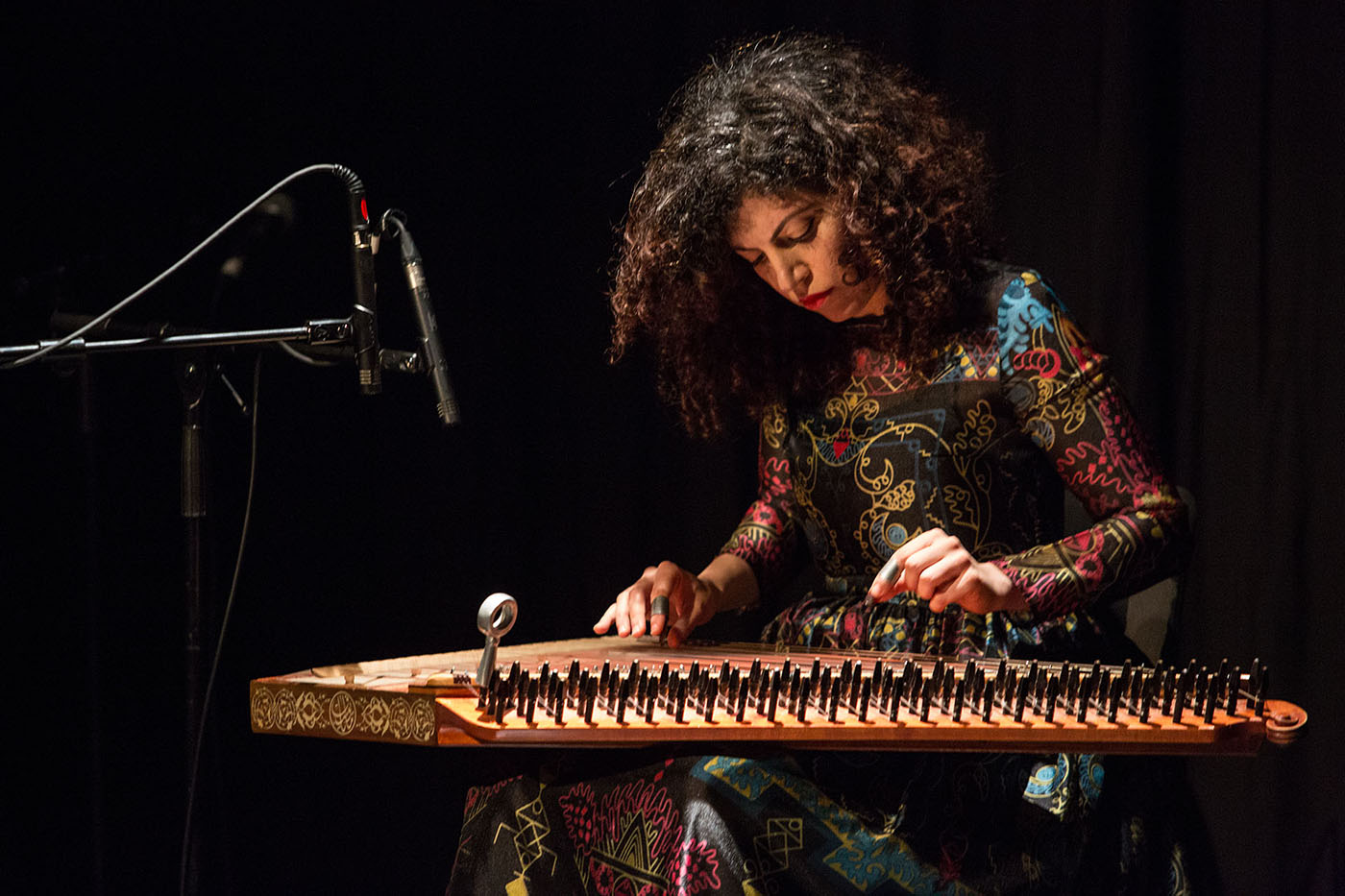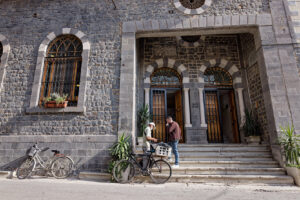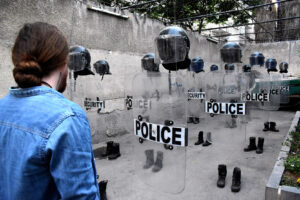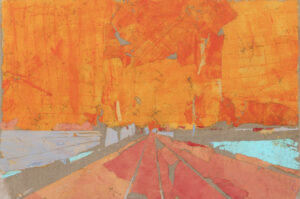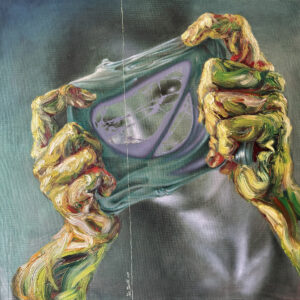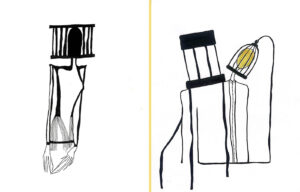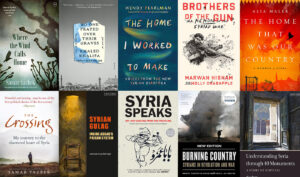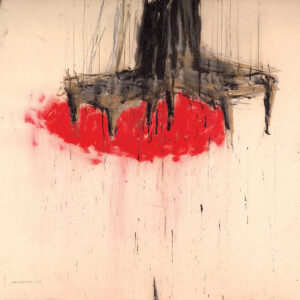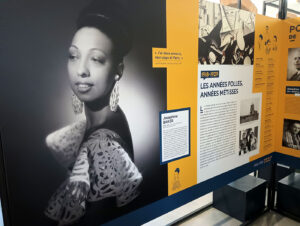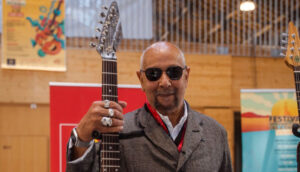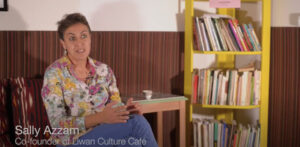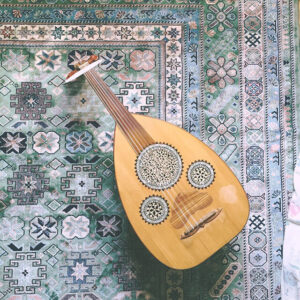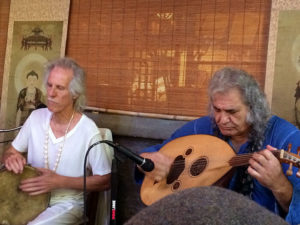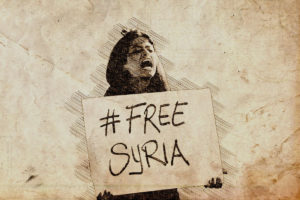Master qanunist Maya Youssef is touring the UK throughout the summer with her new album, Finding Home. For concert dates and tickets, and for album downloads, visit MayaYoussef.com.
In the history of Arabic music the qanun – which means law in English – lays down the law of pitch for other instruments and singers (allows for the correct tuning for all notes on other instruments). It consists of a trapezoid-shaped flat hollow body over which 76 to 81 strings are stretched in groups denoting each note. Classified as a zither, which originated in China as far back as 400 BC, the first zithers showed up in Anatolia, although there is speculation that the qanun played in the Arab world may be descended from the Egyptian harp. Although Arab qanun making is not standardized and is dependent on the maker’s preferences, from the number of strings to the shape and size of its levers, it remains safe to say that most qanuns in the region encompass 78 strings.
To this day, the qanun remains predominantly a male-oriented pursuit in the Arab world, despite a growing number of women showing tentative interest in taking up the instrument in their own homes — the percentage of women to men who go on to pursue a professional career as qanunists is unknown, and as a matter of fact, in Armenia, qanun playing is only a female tradition.
In any case, Maya Youssef is one of the fiercely determined and brave few who from a very early age heard the calling and went in full pursuit of a dream many would tell her was out of her reach. Needless to say, setting off on her path of breaking through expected societal barriers has been a difficult endeavor. And yet Youssef’s self-determination and unwavering belief in joy through music has led to a trailblazing journey for a woman the media has called “The Queen of Qanun,” amassing a remarkable collection of accomplishments and accolades.
“I think that the qanun is a sign of power,” Maya Youssef explains to me over a Zoom call. “The minute you put a qanun on your lap, you immediately attract the limelight.”
Unfortunately, [traditional Arab] society still looks down on women who perform on stage and Youssef still gets called “radical” for pursuing this profession.
“Arab women have historically had a significant role in the evolution of music in Middle Eastern culture. With the advent of Islam, female musicians, referred to as ‘singing girls’ or qayna in Arabic, were a special class of slaves trained in music and poetry and were responsible for the dissemination of music due to the fact that they could be sold and bought — for astronomical prices — on the open market. It is thought that many were composers of muwashahat [an Arabic form of poetry] but because of their status as slaves, or sex workers, their compositions have never been recognized or accredited.”
In those days free women and women of nobility were discouraged from pursuing any form of musical study and certainly prohibited from performing in public. It was only after the 19th century that women started to take a more active role in music and “now more than ever, most of the students at the academy where I teach qanun, in London, are women who come from all parts of the world,” says Youssef.
“I grew up in Damascus in a house surrounded by books and music,” declared Youssef when I asked her to walk me back to where her story with the qanun began. She was raised by parents who not only worked with words (her mother is a translator and her father is the celebrated journalist and writer Hassan M. Youssef) but who also shared a love for music, thereby opening young Youssef’s world to a wide palette of music that ranged from the experimental to jazz, and from western classical to her mother’s beloved Arabic music from the likes of Sabah Fakhri and Umm Kulthum.
“I basically grew up tapping and singing all the time, so my parents enrolled me in a music institute,” she explained. “It was only when I was eight years old and I’d completed two years of training that the pivotal moment arrived when I had to pick one musical instrument and my parents suggested the violin.” And the violin it would have been had it not been for a fateful taxi ride that would ultimately determine the course of Youssef’s life.
“I was headed to the music institute with my mother in a taxi when the driver turned on the radio and there came the sound of a solo qanun that immediately captured my heart. It was then and there that I announced, excitedly and loudly, to my mother and the driver that I had found the instrument I was going to play. The driver actually laughed at me. This instrument is for men ya ammo and you’re a girl. Forget about it. It will never happen, he chuckled. It will, I responded defiantly.”
It seems the heavens were listening for as it so happened a qanun class had just opened up at the institute that very same day. With the blessing of her parents and a second-hand qanun, Youssef was the first of 25 students to sign up for the course. It wasn’t long before she won the Best Musician Award in Syria’s National Music Competition for Youth at the age of 12.
After graduating from The Higher Institute of Music in Damascus in 2007, Youssef moved to Dubai where she believes practicing for 14 hours a day provided the perfect opportunity for her to find her unique voice. In 2009 she was offered a post to teach the qanun and Arabic maqamat at Sultan Qaboos University in Oman. When the war in Syria broke out in 2011, the university didn’t renew her contract, and she’d just had a baby. So, when in 2012, she stumbled upon and applied to the UK’s Tier 1 Exceptional Talent Scheme, she was awarded entry into the country as a qanun virtuoso. She settled in London where she and her son reside today and where she has “given birth” to two albums, collaborated with other performers and was featured on BBC Proms and WOMAD and more recently at the iconic Leighton House in London, which is where I first heard of her.
Maya Youssef’s first album Syrian Dreams constituted a milestone in the qanunist’s career as it marked her first forays into music composition. Never having considered such a move before, the key moment arrived one day as she sat watching TV in her living room in London beside her sleeping son, who was about four years old at the time, when the news of a small girl — who she said looked so much like her own little one — was reported to have died in her bedroom in Damascus as a result of the shelling.
“I was sobbing, covering my mouth with both hands so no sound could escape that would wake my son up, and I left the room closing the door behind me. I picked up my qanun and music started to gush out with the tears.”
In 2017, Syrian Dreams would become the title track of her debut album of the same name into which Youssef poured out her memories, feelings and longings throughout the six years she had watched her country’s descent into chaos. The tracks lend themselves to evocative titles such as “Bombs Turn Into Roses,” “Horizon,” and “The Sea,” among others, that convey a breathtaking range of emotions that yo-yo between the desolate and the sublime. “The Seven Gates of Syria” — my favorite — takes listeners on a sonic tour of the capital’s history via seven different units of music.
“I was always fascinated by Al Kindi’s theory of cosmology whereby he speaks about the connection between the different planets and the maqamat (or modes) and their effect on the human psyche. This idea was very intriguing to me especially that I was born and raised in Damascus and consider myself a Damascene through and through. So when I read historian Ibn Asaker’s account on how the seven gates were built in alignment with seven planets in order to bring peace and prosperity to the dwellers of the city, I was hooked. To this day the name of each planet is visibly etched on the corresponding gate it is aligned with. And that’s where my idea of a sonic tour of my city came from, whereby I aligned each gate with a maqam and a rhythm that best expresses it.”
Although Youssef’s compositions are based on the Arabic maqam, there are playful nods to jazz (Hi-Jazz) and even flamenco (Awatef). Influences streaming into her work come as no surprise knowing that she trained with the likes of Syrian composer and qanun player Salim Sarwa, Azerbaijani musician Elmira Akhundova and Turkish qanun player Göksel Baktagir. And yet she maintains that “writing music is a very intuitive process that doesn’t come from the logical mind. Some claim the source of music comes from the muse, others say it comes from the spirit.” Regardless of the music’s inspiration, Youssef recognizes all interpretations contending that her main job is to surrender to the voice of inspiration, to be its conduit and to allow what wants to come through to do so. This process has allowed for what she describes as “surprising results” that have led to pairing her compositions with a backup choir (Leighton House performance in London), and the introduction of chamber music to accompany the qanun (“Walk With Me”).
When Maya Youssef is not playing the qanun, she’s teaching it. With a self-professed zeal for creating systems, she has come up with a unique universal method she uses to teach maqam using Lego blocks. In a bid to demystify Arabic music, her rationale relies on the playfulness of the act of creating music regardless of whether one is performing to an audience or not.
“I am playful by nature and enjoy Lego parties with my son as we listen to music. In Arabic music, one deals with a cluster of notes — three or four or five notes — and there is basically a certain musical interval, or steps if you will, that come in different sizes, so the steps between the notes is what makes the character of the note, such as Bayati and Hijaz maqams, among others. And so these building blocks – the sonic Lego pieces as I call them – are what create Arabic music. The method relies on a core understanding of how these sonic Lego pieces work when you put them together or switch them around to create different musical models.”
Youssef’s latest “creative baby” as she refers to her albums is Finding Home, which was born when the loss and grief of losing a homeland to the ravages of a civil war necessitated an urgent search for a new sense of belonging. Youssef’s album is fully concerned with finding a state of reconciliation between the nostalgia for the past and the hope within an uncertain present whilst transcending all universal definitions of home, ultimately declaring earth and humanity to be the landscapes for her new sense of belonging.
“When I was writing my first album Syrian Dreams, I felt like the waters of life were gushing behind me and I was helpless to do anything to stop them from sweeping me away and I had no choice but to surrender. With Finding Home, I feel I’m in a gentler place where my music has become part of my spiritual journey. Home is really within me, a state I can tap into whenever I reach a level of calm and soothing through musical practice. And as a state of being, this means that it remains with me wherever I am, regardless of whom I’m with or where I am physically. As such, Finding Home is an ode to all these facets that have helped me reach this state of being.”
Imbued with what she describes as “a tormented sense of responsibility” Youssef’s work has gone beyond performance halls in a bid to connect with the community, particularly the refugees trickling into the UK from Syria. During most tours Youssef allocates a number of tickets for refugees to attend her concerts not only for the musical experience but also to bring communities together in spaces, like traditional concert halls, that can be quite intimidating for most people. She visits schools with high populations of refugees and runs workshops bringing her qanun into the classroom, where she enjoys watching the disbanding of prejudices and judgment as people from diverse backgrounds enjoy the music disseminating throughout the shared space.
Listening to Maya Youssef’s tracks, one senses a quiet insistent power at play that elevates the experience to one that is almost cinematic. One is rendered as if witness to the actual realization of “Bombs Into Roses,” the fulfillment of a “Promise of a Rainbow” and is inspired by the magic of a “Silver Lining,” central to Maya Youssef’s general outlook on life. Youssef assured me that in every live performance, she regales her audience with the stories behind the conception of every piece of music before she performs it, not only to lend it context but also because, in her own words, “she loves telling stories” — for example “Samai for trees” was written after spending time listening to the rustle of leaves under a tree; “Lullaby: A Promise of A Rainbow” was inspired by an image of a mother cradling a baby as she soothes it with a lullaby in the aftermath of an explosion; and “Walk With Me” was written during the Covid-19 lockdowns during which Youssef relied on prayer to see her through the uncertainty and worry.
“Music is the way to open up to the divine to come through and therefore there is no separation between who I am as a person and the music I make. Despite all the hardships I’ve faced as a single mother, a survivor of domestic abuse, a woman displaced from her homeland, when I play music I am home. Music is my prayer for a peaceful world, one that I hope can find healing. When I play I’m locked to the source of all things and in that embrace I am home.”



